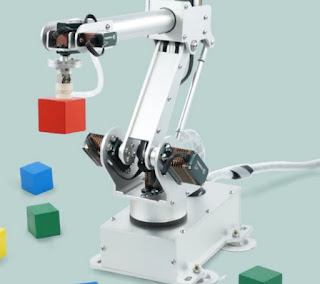Desktop robot arms have been generating of lot of Kickstarter excitement lately offering folks a chance to dabble in the art of hobby robotics without making a significant investment. I've been following them for a while and while the cost is definitely coming down, they are still typically start at around 300USD.
There are a few open source desktop robot arm kits that have been through Kickstarter, here are a couple of my favorites:
- uArm - 4 axis parallel mechanism robot arm based on the ABB IRB 460 PalletPack robot
- 7Bot - 6 axis serial link robot based off the Kuka
 |
| uArm 4 axis robot arm |
 |
| 7Bot 6 Axus robot arm |
As with most of the good open source stuff the Chinese manufacturers seemed to have jumped on the bandwagon and started to manufacture replica kits and knockoffs. You can typically pick up a good knockoff bargain on sites like AliExpress or Bangood.
Hardware:
Recently I came across this mini desktop robot arm on bangood.com that uses hobby servos to create a six degrees of freedom robot arm. As I've seen with a robot hexapod I bought from AliExpress based off the Lynxmotion Phoenix hexapod, the hardware kit will most likely be a slight variation of the original and offer no software support.
 |
| BangBot knockoff of the 7Bot |
Software:
I'm not expecting any software support so while I wait for the kit to arrive in the mail I've started to investigate any open source software solutions rather that starting from stratch with my own. There are a few packages out there, but seeing as the hardware is most similar to the 7Bot I thought I would start there.
The most important info when trying to match the existing software to this robot is the way the joints are oriented on the robot. Simply saying that the arm is six axis isn't enough, we need to know joint lengths and actuator location and orientations to make sure the inverse kinematics are compatible.
 |
| Serial link kinematic chain |
The 7Arm robot seems closest in design to the BangBot robot arm so this seemed like a good starting place for the software.
Taking a look through the code it seems as though the Inverse Kinematics (IK) parameters aren't hard coded so it should allow me to make some minor changes to joint parameters and get the software up and running. I won't go through the specifics of generating a set of inverse kinematic equations for a robot arm, but if you want to read more on the topic take a look at the pages here.
At the moment my biggest issue with compiling the code is my lack of Arduino SAM (32-bit ARM Cortex-M3) boards lying around, so I'll have to try to convert the code to run on a more conventional Arduino device. A the moment I'm thinking maybe the ESP8266 could be a good fit as it is also a 32 bit MCU and has a 160MHz clock frequency as well as EEPROM storage. I'll see how I go making the port, I may need to include a servo control board if the ESP8266 can't handle the task, I've never attempted any servo control with the ESP8266.
No comments:
Post a Comment